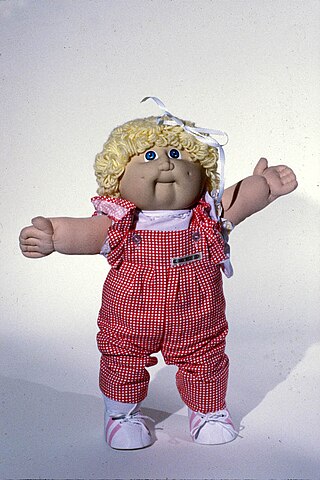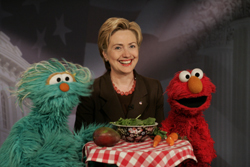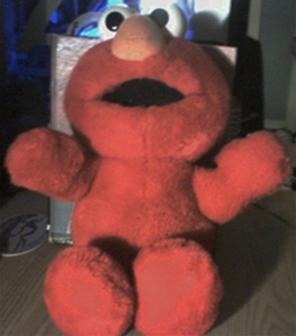Related Research Articles

Mattel, Inc. is an American multinational toy manufacturing and entertainment company founded in Los Angeles by Harold Matson and the husband-and-wife duo of Ruth and Elliot Handler in January 1945 and headquartered in El Segundo, California. Mattel has a presence in 35 countries and territories; its products are sold in more than 150 countries.

Cabbage Patch Kids are a line of cloth dolls with plastic heads first produced by Coleco Industries in 1982. They were inspired by the Little People soft sculptured dolls sold by Xavier Roberts as collectibles. The brand was renamed 'Cabbage Patch Kids' by Roger L. Schlaifer when he acquired the exclusive worldwide licensing rights in 1982.

Elmo is a red Muppet character on the children's television show Sesame Street. A furry red monster who speaks in a high-pitched falsetto voice and frequently refers to himself in the third person, he hosts the last full five-minute segment on Sesame Street, "Elmo's World", which is aimed at toddlers. He was originally performed by Kevin Clash. Following Clash's resignation in late 2012, Elmo has been performed by Ryan Dillon.

Barbie is a fashion doll created by American businesswoman Ruth Handler, manufactured by American toy and entertainment company Mattel and introduced on March 9, 1959. The toy was based on the German Bild Lilli doll which Handler had purchased while in Europe. The figurehead of an eponymous brand that includes a range of fashion dolls and accessories, Barbie has been an important part of the toy fashion doll market for over six decades. Mattel has sold over a billion Barbie dolls, making it the company's largest and most profitable line. The brand has expanded into a multimedia franchise since 1984, including video games, animated films, television/web series, and a live-action film.

Bratz is an American fashion doll and media franchise created by former Mattel employee Carter Bryant for MGA Entertainment, which debuted in 2001.

Tickle Me Elmo is a children's plush toy from Tyco Preschool, a division of Tyco Toys, of the Muppet character Elmo from the children's television show Sesame Street. When squeezed, Elmo recites his trademark giggle. When squeezed three times, Elmo shakes and vibrates.
Since Barbie's introduction as a teenage fashion model in 1959, the doll has been portrayed with many careers. Dolls are sold with sets of clothes and accessories that fit the career being portrayed. For example, the Lifeguard Barbie playset includes a Barbie, an outfit with shoes, a lifeguard chair, a dolphin, and a life preserver, while the Spanish Teacher Barbie includes a Barbie, an outfit with shoes, flashcards, a Spanish quiz, an easel, a notebook, a key chain, and a hairbrush.
Rock 'Em Sock 'Em Robots is a two-player action toy and game designed by Marvin Glass and Associates and was first manufactured by the Marx toy company in 1964. It features two dueling robot boxers, Red Rocker and Blue Bomber, mechanically manipulated by the players, and the game is won when one player knocks the opposing robot's head up and off the shoulders. The 2000s version of the game by Mattel features physically smaller robots.

Fimbles is a British children's television series created and produced by Novel Entertainment. The series has 200 episodes, airing from 2002 to 2004 with repeats airing until early 2012 on CBeebies. The Fimbles are Fimbo, Florrie and Baby Pom, three magical characters who all live in a bright, lush, and colourful place called Fimble Valley. The production of the show itself was filmed at Bray Studios in Berkshire.
Tyco Toys was an American toy manufacturer. It was acquired by Mattel in 1997, becoming one of its brands.
American Girl is an American line of 18-inch (46 cm) dolls released on May 5, 1986, by Pleasant Company. The dolls portray eight- to fourteen-year-old girls of various ethnicities, faiths, nationalities, and social classes throughout different time periods throughout history. They are sold with accompanying books told from the viewpoint of the girls. Originally the stories focused on various periods of American history, but were expanded to include characters and stories from contemporary life. Aside from the original American Girl dolls, buyers also have the option to purchase Truly Me dolls, which vary by eye color, face mold, skin color, hair texture, and hair length. A variety of related clothing and accessories is also available. A service for ordering a custom-made doll with features and clothing specified by the owner dubbed Create Your Own, was introduced in 2017.

MGA Entertainment Inc. is a manufacturer of children's toys and entertainment products founded in 1979. Its products include Bratz, Num Noms, Lalaloopsy, and Rainbow High, as well as toys targeted at boys such as Scan2Go. MGA also owns Little Tikes and animation studio MGA Studios.

Ideal Toy Company was an American toy company founded by Morris Michtom and his wife, Rose. During the post–World War II baby boom era, Ideal became the largest doll-making company in the United States. Their most popular dolls included Betsy Wetsy, Toni, Saucy Walker, Shirley Temple, Miss Revlon, Patti Playpal, Tammy, Thumbelina, Tiny Thumbelina, and Crissy. The company is also known for selling the Rubik's Cube.
Betsy Wetsy was a "drink-and-wet" doll originally issued by the Ideal Toy Company of New York in 1937. It was one of the most popular dolls of its kind in the Post–World War II baby boom era.

Fisher-Price, Inc. is an American company that produces educational toys for infants, toddlers and preschoolers, headquartered in East Aurora, New York. It was founded in 1930 during the Great Depression by Herman Fisher, Irving Price, Helen Schelle and Margaret Evans Price.
In 2007, a series of product recalls and import bans were imposed by the product safety institutions of the United States, Canada, Western Europe, Australia, and New Zealand against products manufactured in and exported from the mainland of the People's Republic of China (PRC) because of numerous alleged consumer safety issues. The many product recalls within the year led Consumer Reports and other observers to dub 2007 "The Year of the Recall.”
Earring Magic Ken, also known as "Gay Ken" and "Fey Ken", is a model of the Ken doll introduced by Mattel in 1993 as a companion to its Earring Magic Barbie figure, one of five dolls in the Earring Magic Barbie line.
The American children's television series Sesame Street is known for its extensive merchandising. Licensees include a variety of companies which manufacture books, magazines, video/audio media, and toys using the characters and themes of Sesame Street.

Mattel Interactive was a video game publisher and software distributor.

Ever After High is a fashion doll franchise released by Mattel in July 2013. It is a companion line to the Monster High dolls, with the characters being based upon characters from well-known fairy tales and fantasy stories instead of monsters and mythical creatures. As with Monster High and Barbie: Life in the Dreamhouse, the line varies in different countries and varies in languages. It has spawned a web series, a film, and a five book series.
References
- 1 2 3 4 Martin, Patti (August 8, 2008). "Red alert!". Asbury Park Press. pp. G1–G2. Retrieved 1 April 2024.
- 1 2 Pilieci, Vito (Feb 16, 2008). "Mattel unveils its latest Elmo". Saskatchewan Leader-Post. Retrieved 1 April 2024.
- ↑ Gaskell, Stephanie (February 15, 2008). "Tickled to See Ya: Latest interactive Elmo Live sings, tells jokes, sits and chats". New York Daily News. Retrieved 1 April 2024.
- 1 2 Casey, Nicholas (October 11, 2008). "Mattel gambles on pricey Elmo". Arizona Republic. p. 46. Retrieved 1 April 2024.
- ↑ Roth, Daniel (2016-01-01). Pope, Charles (ed.). Introduction to Computers and Computing, Pearson Ninth Custom Edition for Indiana University. Internet Archive. p. 248. ISBN 978-1-323-29414-7.
- ↑ WIRED Staff. "Do Humanlike Machines Deserve Human Rights?". Wired. ISSN 1059-1028 . Retrieved 2024-04-02.